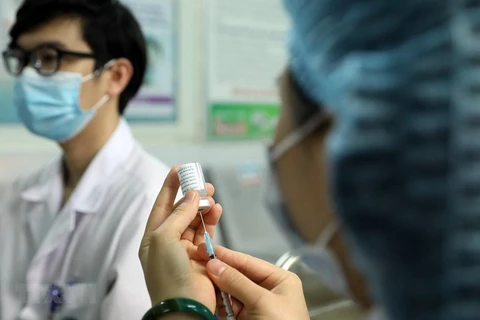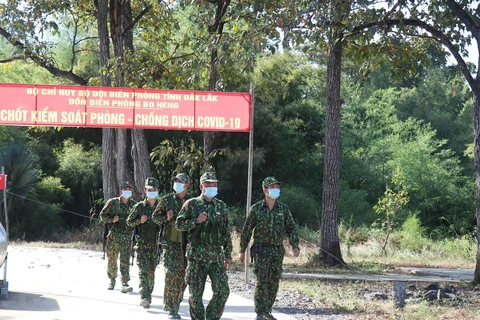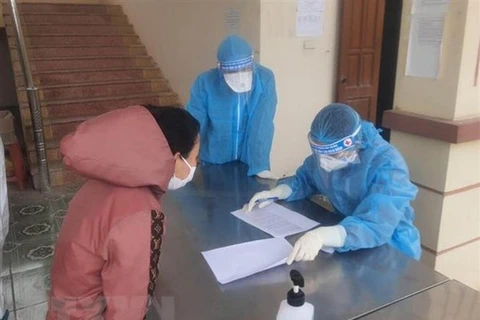Hanoi (VNA) – A “vaccine passport” must include a QR code or its holder should show a COVID-19 vaccination certificate issued by competent authorities in countries and territories that have reached bilateral and multilateral agreements with Vietnam on this regard when entering Vietnam, the Ministry of Health has said.
Citizens from these countries and territories, who come to Vietnam with “vaccine passports” must be fully injected at least two weeks before their entry and less than 12 months since their last shots, heard a meeting of the National Steering Committee for COVID-19 Prevention and Control in Hanoi on April 9.
The ministry also proposed that “vaccine passport” holders should spend a seven-day quarantine period at State-designated establishments and take two tests. If the tests show negative results, they will self-quarantine at home or places of residence for an additional seven days.
Dang Quang Tan, head of the health ministry’s General Department of Preventive Medicine, pointed out the high risk of COVID-19 outbreaks following the roll-out of the “vaccine passport” programme, given a small number of vaccinated people in Vietnam.
Experts at the meeting emphasised the need to press ahead with the inoculation drive, especially in localities.
In his remarks, Deputy Prime Minister Vu Duc Dam, who is also head of the national steering committee, asked the ministry to report the progress of negotiations for COVID-19 vaccine purchase, accelerate the vaccination for prioritised groups, and pay attention to testing.
The health ministry should coordinate with the Ministry of Foreign Affairs, the Ministry of Culture, Sports and Tourism and other relevant ministries and agencies to draw up a roadmap on reopening borders for foreign tourists, targeting those from countries that have put the pandemic under control.
It was reported at the meeting that Vietnam has gone through 15 days without domestically-transmitted infections, and the national count now stands at 2,683.
The northern province of Hai Duong that was once the country’s biggest COVID-19 hotspot also recorded no cases over the past consecutive 14 days./.
Citizens from these countries and territories, who come to Vietnam with “vaccine passports” must be fully injected at least two weeks before their entry and less than 12 months since their last shots, heard a meeting of the National Steering Committee for COVID-19 Prevention and Control in Hanoi on April 9.
The ministry also proposed that “vaccine passport” holders should spend a seven-day quarantine period at State-designated establishments and take two tests. If the tests show negative results, they will self-quarantine at home or places of residence for an additional seven days.
Dang Quang Tan, head of the health ministry’s General Department of Preventive Medicine, pointed out the high risk of COVID-19 outbreaks following the roll-out of the “vaccine passport” programme, given a small number of vaccinated people in Vietnam.
Experts at the meeting emphasised the need to press ahead with the inoculation drive, especially in localities.
In his remarks, Deputy Prime Minister Vu Duc Dam, who is also head of the national steering committee, asked the ministry to report the progress of negotiations for COVID-19 vaccine purchase, accelerate the vaccination for prioritised groups, and pay attention to testing.
The health ministry should coordinate with the Ministry of Foreign Affairs, the Ministry of Culture, Sports and Tourism and other relevant ministries and agencies to draw up a roadmap on reopening borders for foreign tourists, targeting those from countries that have put the pandemic under control.
It was reported at the meeting that Vietnam has gone through 15 days without domestically-transmitted infections, and the national count now stands at 2,683.
The northern province of Hai Duong that was once the country’s biggest COVID-19 hotspot also recorded no cases over the past consecutive 14 days./.
VNA























